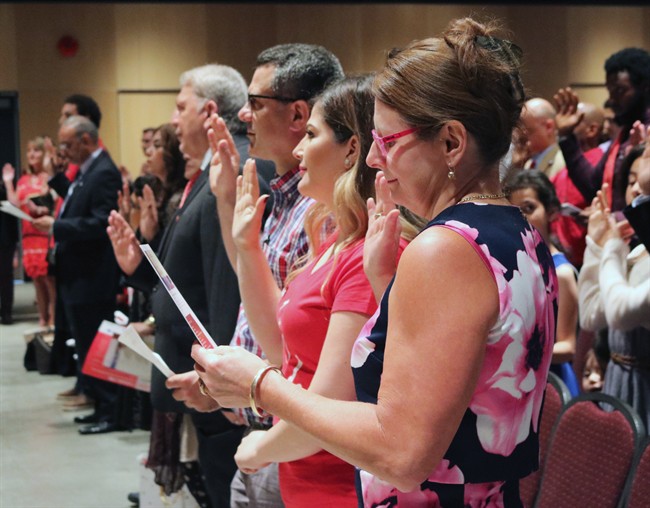The federal government is turning to the private sector to help draft the latest version of the Canadian citizenship test.

A request for proposal went out on Tuesday morning, with Immigration, Refugees and Citizenship Canada (IRCC) explaining that it needs help to “develop a pool of (400) multiple choice official questions, a test blueprint, and 15 versions of the Canadian citizenship knowledge test.”
READ MORE: Could you pass the Canadian citizenship test?
The value of the contract is, as of right now, undetermined. But bidders have until mid-January to submit their proposals and the contract is slated to last one year, likely ending in early 2019.
A spokesperson for IRCC said a rollout date for the new test has not yet been determined.
The Liberal government is also in the process of overhauling the study guide that is used by citizenship hopefuls to prepare for the test. That work is being done internally, however, and isn’t finished yet. It’s unclear how work on the test could begin before the guide is complete.
The request for proposal documents note that “significant revisions” are being made to the guide, and the citizenship test “will need to be updated to reflect the new version.”
“As we have done in the past, we will partner with testing experts to ensure that the test reflects the content presented in the completed study guide,” wrote department spokesperson Remi Larivière in an email.
“This will support the success of our clients while ensuring they obtain and demonstrate the knowledge required for citizenship.”
Last July, a draft copy of that new guide was obtained by the Canadian Press and it generated significant controversy. The draft, which the government took pains to note was not the final version, removed a warning to readers that certain “barbaric cultural practices” such as honour killings and female genital mutilation are crimes in Canada.
READ MORE: Draft citizenship guide obligations include taxes, census, treaties
The Conservatives, who were responsible for inserting those warnings into the study guide in 2011, have called on Prime Minister Justin Trudeau and Immigration Minister Ahmed Hussen to keep them in.
Conservative immigration critic Michelle Rempel has been particularly outspoken about the issue, repeatedly questioning the prime minister on the subject during Question Period.
WATCH: Female genital mutilation practitioners are travelling to Canada, border officers warned

The draft study guide obtained by the Canadian Press last summer also included much more detailed information about past discrimination against Chinese people, South Asians, Jews and disabled Canadians, more details about the evolution of LGBTQ rights in Canada and lengthy paragraphs on the residential school system and the history and present-day lives of the country’s Indigenous Peoples.
It’s unclear how many of these proposed changes will end up in the final guide.
“As the new guide is still under development, we are unable to provide additional information on the content,” Larivière said Wednesday.
Time for an overhaul?
The written test is just one of many steps toward citizenship. People hoping to become Canadian citizens must first prove they know about the country’s history, demographics, geography, politics and much more. Right now the test contains 20 multiple-choice questions, and applicants must get at least 15 correct to pass. That’s not expected to change.
Immigration lawyer Hadayt Nazami says the test is long overdue for an overhaul.
“It’s not about it being easy or difficult, it’s about it being relevant to today’s circumstances,” he said. “But also being more relevant to what Canada is today and what Canada represents today.”
WATCH: Canadian government wants 310,000 immigrants in 2018, 340,000 a year by 2020
Nazami also said that while there’s nothing wrong with a good dose of national pride, the current test over-emphasizes the positive aspects of Canada’s past and present. Another common problem is the language barrier some immigrants face when studying for, and taking, the test.
And, Nazami noted, it’s not cheap. The overall citizenship application process now costs $530 per person, which includes testing.
These are some of the things that might come to light, he said, if the contractor in charge of writing the new questions was able to engage in some basic consultations. That’s not currently part of the proposed contract.
“It would be a good idea to at least get a sense of what the experts in the area know, having spent a lot of time with people,” Nazami said.
“Personally I know people who didn’t apply for citizenship because they knew they couldn’t pass the test, or who applied twice and then just gave up, and were not quite happy and for years they’ve lived like that.”
If an applicant fails the written test, they’re given a second chance to pass, and if they fail it a second time, they must meet face-to-face with an immigration official who will assess if they meet requirements like language proficiency and knowledge of Canada. If they fail that time, their application is refused.
- Life in the forest: How Stanley Park’s longest resident survived a changing landscape
- ‘Love at first sight’: Snow leopard at Toronto Zoo pregnant for 1st time
- Carbon rebate labelling in bank deposits fuelling confusion, minister says
- Buzz kill? Gen Z less interested in coffee than older Canadians, survey shows




Comments